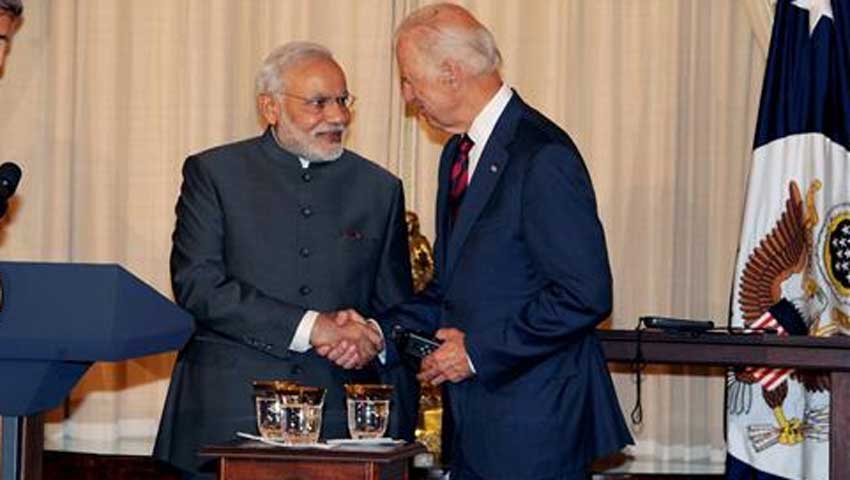The evolving partnership between India and the United States, and their respective ties with China, is most consequential in terms of the length and breadth of global issues, in which the countries are stakeholders, ranging from military to non-military ones.
The Quadrilateral initiative is being strengthened and getting reflected in the intensification of India-US strategic partnership. The unfolding of various initiatives undertaken by the members of the Quad epitomises the willingness to rule based global order. The perception that Quad was established to contain China’s rise is highly flawed. Technically, Quad as an informal grouping got evolved over the years for having a shared commitment among members to significantly contribute to achieve peace and stability. Though, China’s projection of its power trajectory may look highly intimidating and seems challenging to address but Quad has a potential to bring China under the ambit of international law.
The recently concluded virtual summit of the leaders of the Quad countries, India, the US, Japan and Australia released a joint statement invoking “The Spirit of the Quad”. The establishment and statement of understanding at the highest level of political leadership, lends to new heft to the Quad in the emerging geopolitical environment of the Indo-Pacific. The global pandemic, while making countries realise the upsurge of new challenges of ensuring global health, is also coming to terms with growing great power competition in the Indo-Pacific region. The rise of China’s aggressive behaviour in the South China Sea, at the Sino-Indian border and its “wolf warrior” diplomacy to silence global criticism of its response to coronavirus outbreak, has had negative repercussions for global peace and stability. China’s ambiguity in terms of financing infrastructure projects in the Indo-Pacific through its ambitious Belt and Road Initiative (BRI) has also called the attention of the Quad members. In the pursuit of a “free, open, inclusive and rules based” Indo-Pacific, aligning the multilateral setting with the bilateral relations among the Quad members is imperative.
The evolving partnership between India and the United States, and their respective ties with China, is most consequential in terms of the length and breadth of global issues, in which these three countries are stakeholders, ranging from military to non-military ones. Both India and the United States in their respective engagements with China have been attempting to manage relations and make the latter realise the goal of stable regional security architecture in the Indo-Pacific. India as the new Chair of the BRICS grouping will be hosting this year’s summit, and a US-China diplomatic meeting has been convened in Alaska. The rise of China has had a seismic impact on emerging geopolitics, at the global and regional levels. Therefore, it is imperative for China to show due respect and recognition of the rule of law and the need for interstate cooperation to solve many impending challenges to multilateral governance across the Indo-Pacific including issues like climate change and confronting the multifaceted impact of the pandemic.
In this pursuit, how India and the United States engage with China where it can, and confronting the threats posed by China where it must, is a task cut for India-US partnership and for the Quad. By its aggressive behaviour at the Sino-Indian border, militarization of space in the South China Sea and its muscle flexing in the Taiwan Straits, China has pushed regional dynamics in the Indo-Pacific to a more confrontational dimension. This is happening at a time when it was required for all countries to come together and work towards mitigating the comprehensive impact of the global pandemic. As the Quad countries “strive for a region that is free, open, inclusive, healthy, anchored by democratic values, and unconstrained by coercion”, adroit multilateral and bilateral diplomacy will be required to handle China in a way that is conducive for regional peace and stability.
How India and the United States in their respective engagements as well as through the Quad, work with the ASEAN countries to implement the notion of “ASEAN centrality and unity” remain a matter of focus in the near future. Quad’s support for “rule of law, freedom of navigation and overflight, peaceful resolution of disputes, democratic values, and territorial integrity” are clear signals to the Chinese establishment that actions that are detrimental to regional security will not be in China’s interest as well. In terms of both opportunities and challenges, the Indo-Pacific region is clearly the most dynamic one, which requires more deliberations among multiple agencies and in this regard, how the political leadership in India works with the Biden administration will be highly significant.
The realm of new technologies and innovations is another area, where the advances that China makes and how it deploys them, will be highly consequential for the region. In the field of cyber, outer space, information and communication technologies, artificial intelligence and machine learning, India and the United States, and their Quad partners need to keenly watch China’s capabilities and strategies. The question is not only about competition, but also about employing the right kind of strategic negotiations to affect China’s behaviour for the benefit of regional stability in the Indo-Pacific. As the Quad leaders aim to convene in person by the end of 2021, and attempt to dispel the misperception that the Quad is aimed only at containing China and clarify its multifaceted vision and mission, many crucial questions relating to the pursuit of a “free, open, inclusive and rules based” Indo-Pacific will dominate the agenda. India and the United States together will remain part of the solution.
Arvind Kumar is Professor of American Studies at School of International Studies, JNU. Monish Tourangbam teaches at the Department of Geopolitics and International Relations, MAHE, Manipal.

